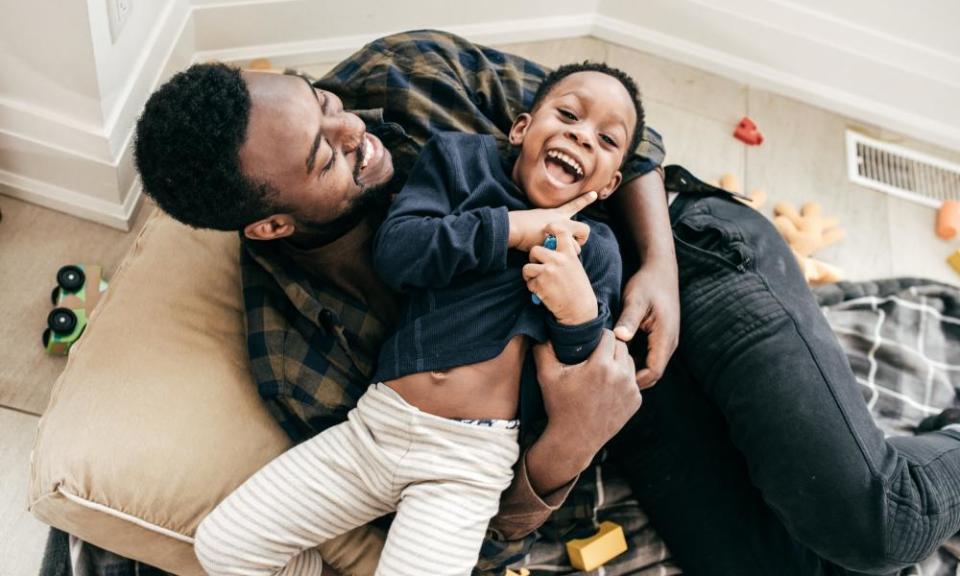How can playful parenting support children to learn through play?

The phrase “playful parenting” might be one you haven’t heard before, yet it’s an approach that most parents naturally adopt – with enormous benefits for both childhood development and success in later life.
“The interactions young children have with the important adults in their lives are a critical factor in a child’s brain development in the first three years,” says Gemma Tumelty, initiative lead for playful parenting at the LEGO Foundation. The “best and most enjoyable way” for parents to support their child’s development and emotional wellbeing is through play.
Playful parenting can be part of everyday family routines and doesn’t require costly resources. “Cardboard tubes, pots and pans, and water play can be just as much fun as something bought from a shop,” says Tumelty. “And parents themselves report that playing with their children makes them feel good, while families playing together is proven to reduce stress and anxiety.”
Dr Jack Shonkoff, a renowned paediatrician and founding director of the Center on the Developing Child at Harvard University, is a passionate advocate of playful parenting. “From a very deep scientific perspective, we know how much early experiences influence the development of the brain, and how much that affects the foundations of effective learning,” he says. “Play is the most powerful way for children to learn and, for parents, one of the most powerful windows into the life of their child.”
Fostering a playful home environment actively builds the brain architecture that helps children thrive in early childhood and throughout their lives. When parents and caregivers respond to young children in back-and-forth playful engagement – known as serve and return interactions – connections between neurons are formed that build strong foundations for all the higher-level skills that come later. “The amazing thing is that the human brain is wired to expect this responsive and nurturing environment, and if a child doesn’t receive that, it impacts their brain development,” says Tumelty.
Parenting roles have changed significantly over the past year. Fathers, in particular, have had the opportunity to spend more time with their children, honing play skills that support development.
Adverse childhood experiences also affect brain development, and persistent stress – if there is no adult present to help buffer it – can have damaging effects on a child’s learning and behaviour across their lifespan. The pandemic increased risk of illness, social isolation, and added to the pressure on parents and caregivers. But in a pandemic, the value of play goes beyond the usual benefit of helping parents learn about their child. “Play provides a very natural and non-threatening way for parents to not only engage in a pleasurable way with their children, but to learn about how their child is coping in the context of increased hardship,” says Shonkoff.
There’s growing evidence that the lockdowns have had a negative impact on many children, with greater numbers needing help with language development. “Some children have experienced fewer social interactions that are essential for increasing vocabulary and, anecdotally, daycare providers report that children have struggled to settle in due to less exposure to daily experiences that are important for healthy development, and few opportunities to be in environments outside the home,” says Tumelty. “Social inequalities have been exacerbated by the pandemic, too, meaning families with outdoor space, access to the internet, and flexible working opportunities were more likely to have been protected from some of the negative consequences of the pandemic on speech development and social skills.”
Access to healthcare is vital for healthy child development during the early years. Developmental screenings, health checks and vaccination programmes help prevent and identify health issues, while providing support for caregivers. “The lack of face-to-face interactions during the pandemic is devastating,” says Tumelty. “We know one of the most effective ways to help parents is through face-to-face interactions; however, we are eager to understand how online interactions also support that work.”
Until such interactions resume, online resources that support parents and provide inspiration for playful parenting can be key. Tumelty recommends seeking out trusted sources and resources that are easy to incorporate into your life. “Parents are bombarded with an array of information on every platform imaginable, which can feel like trying to hold yourself up to impossible parenting standards,” she says.
“I want to say to parents: take the pressure off, keep it simple – you can create wonderful, playful interactions using household items and the recycling bin. There are many brilliant online resources to guide you through age-appropriate, affordable playful activities that are easy to build into your everyday life.”
Related: ‘It’s about supporting their curiosity’: how to build child-parent relationships through play
Resources to support playful parenting include the Unicef parenting hub, an online platform featuring guidance from world-leading experts, and the LEGO Foundation Playlist, a regularly updated online library of learning activities for children, created at the start of the pandemic by the LEGO Group and LEGO Foundation with help from play and child development experts.
Sesame Workshop, a not-for-profit organisation, also offers practical parenting advice, and Parenting for Lifelong Health has tips to help parents and caregivers during the pandemic.
While play is vital for healthy child development, Shonkoff cautions that it shouldn’t be a source of excessive pressure. “If parents find play intimidating or feel they aren’t playing with their child well enough, what they most need is help relaxing,” he says. “Somebody who helps you figure out how to have more fun playing with your child will be much more helpful than somebody who tells you how you should do it. Play is not a special expertise that parents need to learn. Play is a natural instinct that needs to be valued.”
Are you looking for fun and engaging learning through play activities for your children? Visit the LEGO Foundation’s Playlist

